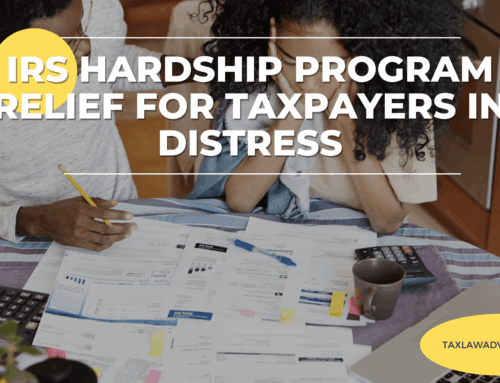
Tax season can be a stressful time, and it’s not uncommon to make errors or omissions on your tax return. Fortunately, the IRS provides a way to correct these mistakes by filing an amended return. But when should you consider amending your tax return, and what does the process entail? In this comprehensive guide, we’ll explore situations that warrant filing an amended return, the steps involved, and how Tax Law Advocates can assist you through this process. Remember, if you need expert guidance, you can contact us at 855-612-7777 or visit taxlawadvocates.com.
Understanding Amended Returns
Filing your tax return is a meticulous task, and errors can occur even with the best of intentions. Whether it’s a simple math mistake, a forgotten attachment, or a significant change in your financial situation, there are various reasons why you might need to file an amended return. Here’s what you should know:
File a Superseding Return If the Filing Deadline Hasn’t Passed
If you discover an error in your tax return shortly after filing, you may not need to file an amended return. Instead, you can file a “superseding return” before the filing deadline, and it will replace your original return. This can be advantageous if, for example, you initially applied your overpayment to the following year’s taxes but later require a refund.
Let the IRS Correct Certain Errors
For minor errors like math mistakes or omitted forms or schedules, you usually don’t need to file an amended return. The IRS can identify and rectify these errors during processing. However, more significant changes affecting your filing status, income, deductions, or credits may necessitate an amended return.
Use Form 1040-X
If you do need to file an amended personal income tax return, Form 1040-X is typically the required form. It’s used for correcting Forms 1040, 1040-SR, or 1040-NR and for making certain elections, adjusting amounts, or claiming a loss or unused credit carryback.
Electronic Filing of Amended Returns
The IRS now allows electronic filing of amended returns for various situations. You can amend returns for tax years after 2018 electronically, including cases where your filing status changed or you need to add a dependent. This electronic filing option simplifies the process for many taxpayers.
Time Limit for Filing
Generally, you must file an amended tax return within three years from the date you filed your original return or within two years from the date you paid any tax due, whichever is later. However, there are exceptions based on specific circumstances, so it’s essential to consult the instructions for Form 1040-X for precise details.
Pay Any Tax Owed Right Away
If amending your return results in additional tax owed, it’s crucial to pay it promptly to avoid IRS interest and penalties. The IRS charges interest on unpaid taxes from the due date, and penalties may apply if you don’t pay within the specified time frame. Exploring payment options and potential penalty waivers can be beneficial in such situations.
Track the Status of Your Amended Return
After filing an amended return, you can track its status through the IRS’s “Where’s My Amended Return?” tool. It typically takes a few weeks for your amended return to appear in the system, and the processing period can vary.
Common Reasons for Filing an Amended Return
Now that you understand when to file an amended return let’s explore some common scenarios that might prompt you to consider this option:
Claim Missed Deductions or Credits
The tax code offers numerous deductions and credits, and it’s easy to overlook some that apply to your situation. If you discover a deduction or credit you qualify for after filing your original return, filing an amended return is a way to claim it and potentially receive a refund. It’s important to weigh the benefit against the effort involved.
Retroactive Tax Law Changes
Tax laws can change, and sometimes these changes are applied retroactively. If a new law or tax break is enacted later in the year and affects your previous tax returns, filing an amended return can allow you to benefit from the new provisions.
New Information After Filing
Receiving new information, such as an amended W-2 or 1099 form showing previously unreported income, can necessitate an amended return. Changes to your income can impact deductions, credits, and even the alternative minimum tax, so it’s essential to address such situations promptly.
Disaster-Related Deductions
Victims of natural disasters like hurricanes or wildfires might be eligible to claim casualty loss deductions for the tax year preceding the disaster. Filing an amended return can help you secure this deduction, but specific criteria must be met, including a federally declared disaster in your area.
State Tax Implications
Changes made to your federal return might also affect your state tax liability. If you discover that a change in your federal return results in a more favorable state tax outcome, filing an amended federal return may be worthwhile, as it could lead to overall tax savings.
Take Control of Your Tax Situation
Filing an amended return can be a powerful tool to correct errors, claim missed deductions or credits, and adapt to changing tax laws. While the process may seem daunting, it’s essential to address significant discrepancies to avoid penalties and interest.
Tax Law Advocates is here to assist you in navigating the complexities of tax law. If you’re unsure whether you should file an amended return or need expert guidance on your tax situation, don’t hesitate to contact us at 855-612-7777 or visit taxlawadvocates.com. We have a team of federally licensed and enrolled agents, tax attorneys, and accountants ready to help you make informed decisions and achieve financial peace of mind.
Remember, understanding your tax rights and responsibilities is the first step toward ensuring that your tax return accurately reflects your financial situation. Take control of your tax situation today and let Tax Law Advocates be your trusted partner in your tax journey.





